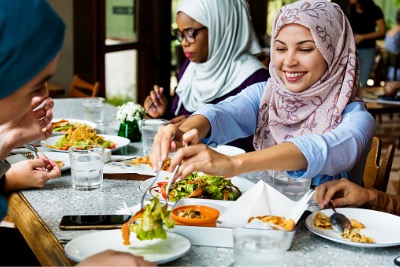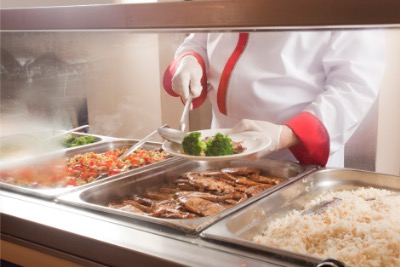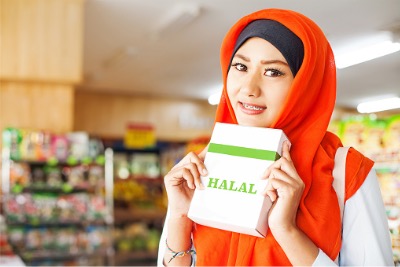
Halal Food Options on College and University Campuses
Attending university marks a significant shift in lifestyle for any student. Students want to be able to settle in quickly and succeed. Whether the school is at home or abroad, when Muslim students choose a university they often search for institutions that have Halal lifestyle accommodations. That includes Halal certified food, places to pray, a community and more.
Many students are concerned with the availability of Halal certified food options at universities in the USA and Canada. Of the 4,360 higher education institutions in the USA, how many offer Halal food options to Muslim students? Well, the answer is – not many. In a brief survey that asked Muslim students on social media whether their university offers Halal food options, and if yes, what those options are. Over 70%, of respondents said that their university had no Halal food options. If they eat on campus, they stick to the vegetarian menu or they pack a lunch.
The students who responded that there are Halal food options at their college, typically went to schools in large cities that have many Muslim students. For example, schools like NYU in New York, University of Michigan in Ann Arbor (near Detroit), University of Chicago, Boston U, Columbia and other universities in large urban centers all have Halal certified food options for students. That being said, there are some small private colleges in remote areas that offer Halal food options. Like for example, Grinnell College in Iowa and Williams College in Massachusetts.

Responses to “What Halal options do you have?”
“I go to the University of Chicago; we do have a Halal food line at each of our dining halls. Most of the people who eat there aren't even Muslim, it's just good food. But it's food that is prepared in accordance with Islamic principles, so at least U Chicago cares about its minorities.”
One student from Princeton said, “I chose to attend a college that provided a variety of Halal certified food options. College students have a lot to worry about. Like classes, schoolwork, extracurricular activities, personal life, working, family, friends, being away from home. We don’t need to worry about finding something permissible to eat on campus.” It should be noted that most Ivy League schools, have Halal accommodations for students.
One student said, “I wasn’t Muslim when I was in college, but my Muslim friends ate either kosher food or vegetarian. In a small college, the cafeteria might have salad, pizza, and vegetarian soup. Another student said, “I would eat vegetarian or pescatarian food on campus. We had no Halal food options.” Another student said “I attended 3 universities, and worked at 2 universities and none of them had any Halal accommodation. I chose vegan or vegetarian options.”
Another respondent said, “I go to university and there is no satisfiable Kosher/Halal option available. Yes, they do sell some Kosher/Halal certified food in the grocery store, but there is no dining option. The university still refuses to give Kosher/Halal food despite requests every semester.”

In Canada
“Most universities have Halal dining options. On and off campus and in dorms. There are restaurants and cafeteria options. The dorms also have kitchens where people can store your food separately and away from non-Halal items.” It should be noted that Canada has 101 public universities and colleges that are federally and provincially funded and controlled. Unlike the USA, the universities have many similarities. The Muslim student population is approximately 110,000 students. 46% percent of Canadian Muslims have a college degree vs. 23% of the general population. And they are more likely to pursue advanced degrees and there are over 13,000 PHDs, many of whom work at universities.
How to find out if a school has Halal food options?
One way to find out whether or not a university has Halal food options is to talk to suppliers and distributors of Halal foods. Companies like Sodexo, Sysco and Aramark actually supply Halal, Kosher and other specialized foods to universities. Another is to simply contact the schools during the application process. Or ask at recruitment events. In many countries, there are agents and educational consultants that can help students choose the right college for their lifestyle. Non-Profit organizations like the MSA can also be contacted.
How to get Halal Food on Campus
To get Halal food on a campus that does not have Halal food options is a process. Read about the struggle to get Halal food to be served at AU. The mission was accomplished in 2018. The National Muslim Students Association has a Halal Food Guide, which gives students step by step instructions on how to get Halal food on campus.
They break the Halal food accommodations into levels with:

- Level 1: Labeling food inappropriate to Muslims in dining halls. Even the seemingly innocent yogurt can be inappropriate if it contains gelatin from pork sources.
- Level 2: Allowing Halal food vendors to be covered in Munch Money, Dining Dollars, or similar meal options that allow for a certain amount to be spent outside the main cafeteria.
- Level 3: Allowing students to take food out for the pre-dawn Ramadan meal (suhoor) or arranging to have halls open at that time.
- Level 4: Serving Halal food on a given day of the week. Think Halal burger night.
- Level 5: Designating a particular dining hall or section of a dining hall to always have Halal certified food available.
To get Halal food on campus is a multi-stage process. The MSA report advises students to treat it like a project. Assign leaders and break the process up into achievable tasks:
- Assessment – do the research, get the numbers and facts to support your proposal
- Presentation – contact allies, other groups that will support your cause, and set appointments with administration
- Education and Communication – train staff and communicate with the public
- Long Term Strategy and Plan – keep it going and growing.

Whether domestic students or international, when Muslim students choose a university, they often search for institutions that have Halal lifestyle accommodations. That includes Halal food, places to pray and more. By not having Halal accommodation, many universities are missing out on both international and domestic student recruitment. Universities who want to include Muslim students in their various dining experiences, whether restaurant, dorms, dining halls, grocery stores, can do so easily. Islamic Services of America has been advising universities on their Halal certified dining options for decades. We are ready to help universities and colleges implement Halal dining from A to Z.
At ISA, we believe the more research and insights into the market will lead to more success for our customers, associates, and the Halal certification industry in general. Knowing consumers preferences, behaviors and trends is a big part of this.
Islamic Services of American (ISA) is a leading USA based Halal certification and auditing organization serving companies, the community, and the Halal certification industry for nearly 50 years. Contact ISA at isa@isahalal.com or visit the ISA website for more information at www.isahalal.com

Picture credit: www.istock.com